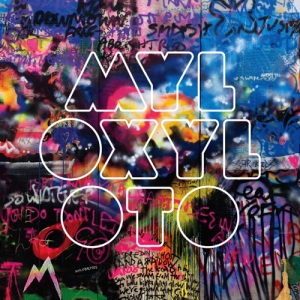While sitting in my room listening to the new Coldplay album, Mylo Xyloto, I was terrified that some mysterious music police would bust down my door at any moment and strip me of the music appraising credentials I like to imagine I’ve earned in my years of in-depth music analysis (or as some might prefer to call it, my years of sitting alone in my room). I couldn’t help but feel a sense of castigation coming my way for even listening to Coldplay, despite the fact that Mylo Xyloto is the first Coldplay album I’ve really given an in-depth listen to since I was twelve. In the world of music snobbery, it’s difficult to think of many artists more off-limits than Coldplay, and I can’t really say that I know anyone who was excited to hear the band’s latest effort.
I could start off criticizing the lyrics, where realistically, I could pick apart nearly every song. Some of the more standout lyrics — “You use your heart as a weapon / And it hurts like heaven,” “Every tear is a waterfall” and “Through chaos as it swirls / It’s us against the world” — have been forcing me into random bouts of confused anger. Then there’s the production value, which for a record where millions were easily spent in the studio alone, is surprisingly poor on some of the busier tracks. At times I felt more lost in a wall of sound than I should have. Coldplay also seems to be jumping on the mainstream electronic music wave just in time to ride the coattails of other artists that have carved out this territory in the past few years.
I wonder, though, how productive it would really be to delve further into these issues. Even though I take issue with many aspects of the album, the music really isn’t that bad considering what Coldplay wants to accomplish. Pondering the band’s past successes, it seems that there are two very apparent goals at work with this record. One is to create stadium-ready alternative rock, the kind that 50,000 people can dance along with and scream the words to; in this respect, they have succeeded mightily.
The other goal, bluntly put, is to sell as many records as possible. The album sold 447,000 copies in the United States in the first week alone, and debuted at number one in thirty different countries according to Coldplay’s official Twitter. It’s apparent that they’re well on their way to achieving this goal, and that someone, somewhere really likes Coldplay.
In an interview with Stephen Colbert on October 20, Chris Martin (lead vocalist, pianist and rhythm guitarist) was asked whether Coldplay’s music has been influenced by the group Radiohead, critically-acclaimed kings of the alternative rock circuit. To this, Martin responded simply, “We’re not as good musically, but much more attractive.” While The Colbert Report is hardly the most serious stage for hard-hitting interviews, embodied in this statement is what I believe to be the real issue I take with Coldplay. For any band to compromise their talent for the sake of appearances is incomprehensible. Furthermore, for a band to peddle attempts at accessibility as legitimate artistic strivings is unacceptable.
For this I take much more offense with Coldplay’s marketing and promotion of Mylo Xyloto than I do with the actual music. Their decision to keep Mylo Xyloto off of streaming services such as Spotify, Rhapsody and Rdio — a decision that even Coldplay’s label, EMI, was upset with — was rationalized by the band as an attempt to get people to enjoy the album as “one cohesive work,” despite the fact that individual songs are available for purchase on various online music retailers. Allowing people to purchase individual songs but not stream them points to Coldplay’s greed more than their concerns for artistic credibility.
There is also the band’s latest image, specially cultivated for this album alone. Everything from the album art, to the promotional material, to the band’s clothing reeks of a post-apocalyptic anarchy clashing with the Indian Festival of Colors. There would be nothing inherently wrong with this image if it didn’t seem so apparent that the colorfully muted military garb — donned with randomly placed rainbow colored patches with no clear meaning — was not carefully chosen by the band themselves, but by corporate focus groups. Even the name of the album itself is meaningless, though disguised as a careful attempt at creating artistic value.
There are a few suggestions I could make to the band if they want to legitimately validate themselves artistically. Following in the steps of Radiohead, Coldplay could benefit immensely from an album release modeled loosely around the famous release of Radiohead’s In Rainbows, which gave listeners the option to pay whatever price they desired for a digital copy of the album, a move that would be perceived as a massive turn away from the traditional record company establishment.
Instead of selling out stadiums all over the world, Coldplay should try their hand at a low key tour of hole-in-the-wall music halls, where they could get back in touch with their biggest fans at eye level. Lastly, and most desired on my part, is for band leader Chris Martin to shed his good-boy image of being the quiet, respectable singer married to Gwyneth Paltrow.
I would enjoy nothing more than Martin falling apart at the seams, performing visibly hammered at the Grammy’s, spitting on legions of loyal fans all over the world and generally becoming a bonafide rock Neanderthal. Sadly, it’s hard to imagine this coming to fruition in the foreseeable future, and conversely, it’s hard to imagine Coldplay becoming a truly respected group any time soon.












-Yawn- How boring this article is. You’re sitting here ranting about a band that is clearly unconcerned with this article. No one even knows about this article, really. You’ve wasted your time with this article. Just saying. People have lives, and I think you should get one. By the way, the article was too damn long, so I didn’t read the shit.
And not only that, but Coldplay has released five albums. 3 of which have reached number one in the U.S. And all of them have reached number one in the U.K. Do you really think anyone gives a shit about what you have to say here? If you think so, you’re in need of a reality check.
NM – What reason do you think you have that makes these comments worth anything at all? Of course Coldplay doesn’t care about this writing, but that doesn’t make it any less true. If you think the author should get a life then clearly you’re even worse off than him for wasting your time trying to debase this.
[…] subconscious I got the idea that my opinions matter. I recently got some feedback about this on an article I wrote for my college new paper from a kind and devoted reader. In response to a review of the […]